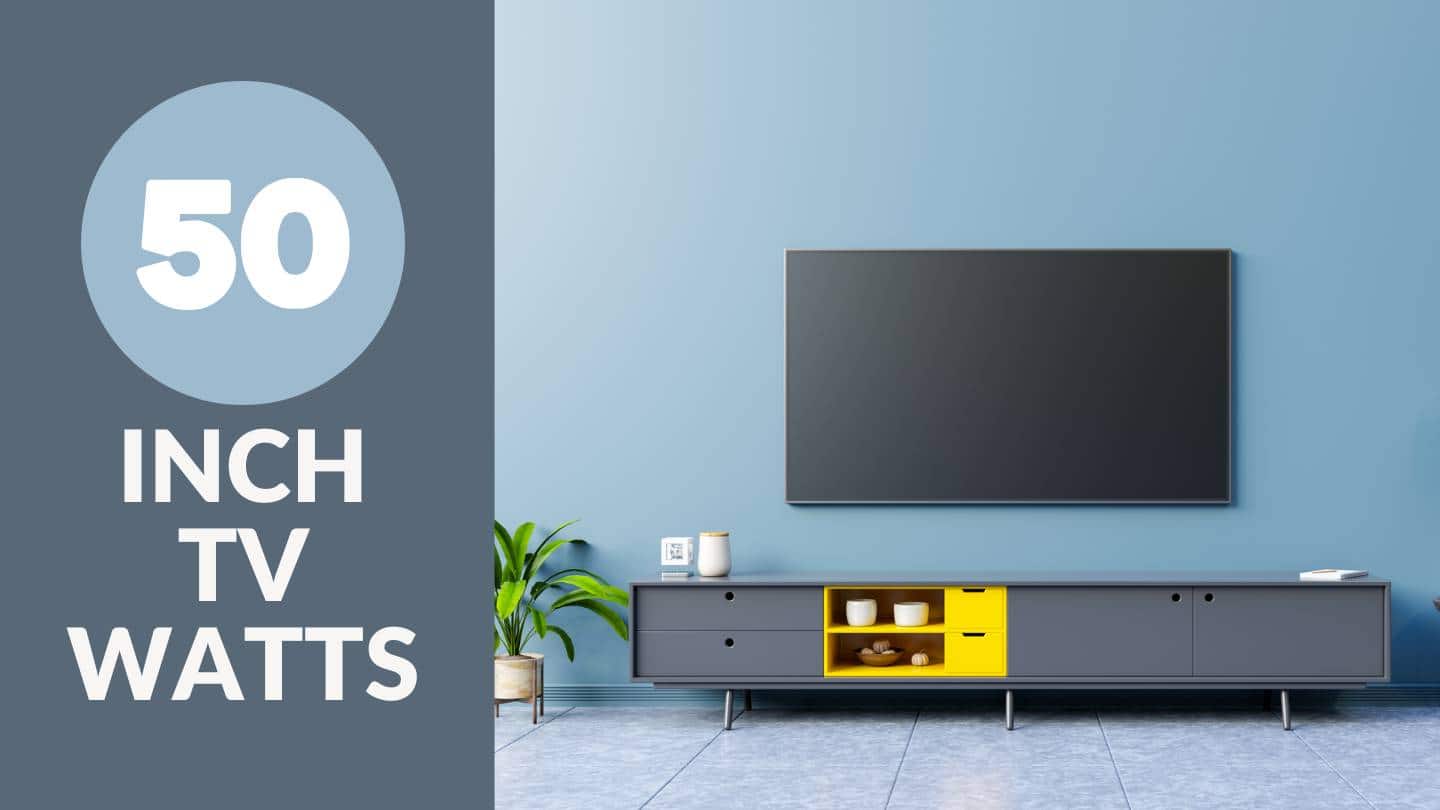When choosing a new TV, energy efficiency is an important consideration if you’re tailgating, camping, living off-grid, or if you just want to conserve energy.
In this article, we will explore the power consumption of 50-inch TVs from different brands, based on the data I collected on 46 different models from six different manufacturers.
Let’s dive in.
How Many Watts Does a 50-inch TV Use?
To determine the average wattage of a 50-inch TV, I collected data on 50 inch TV watt ratings from leading TV manufacturers Hisense, LG, Philips, Samsung, Sceptre, and Toshiba.
Based on that data, the average power consumption of a 50-inch TV is approximately 86.5 watts when operating under typical conditions.
Some manufacturers provide maximum power consumption data, of the 26 models that included max. data the average maximum power consumption was 127.7 watts.
It’s important to note that your TV’s actual wattage may vary depending on the brand, display technology, age, and specific model you have.

Table of Contents
Are 50″ TVs Energy Efficient or Power Hungry?
Compared to other household appliances, TVs are pretty energy efficient.
For example, the average air fryer uses 1,604 watts, compared to 86.5 watts for a 50″ TV. The big difference in power consumption comes from the amount of time that each appliance is running. (See table.)
| Household Appliance | Average Running Wattage (W) | Average Running Time/Day (hours) | Watts Used/Day on Average | Cost/Day (Based on 15.47 cents per kWh) |
| 50 Inch TV | 86.5 | 5.4 | 467.1 | $0.07 |
| Refrigerator Freezer | 60 | 8 | 480.0 | $0.07 |
| Air Fryer | 1604 | 0.25 | 401.0 | $0.06 |
| Microwave | 1650 | 0.5 | 825.0 | $0.13 |
As you can see, even though you might only use your microwave for only 15 minutes a day, it can cost more than the average 50″ LED TV turned on for 5.4 hours.
How Many Watts Does a 50″ TV Use in Standby Mode?
Across all of the TVs that I was able to gather data for, over 462 in total, the average standby mode power consumption was less than 1 watt per hour.
And a quick calculation shows us that at a rate of 1 watt per hour, a typical TV in standby mode would use 24 watts per day, or 720-watt hours in a 30-day month.
U.S. Energy Information Administration data shows that the average residential electric rate per kWh is 15.47 cents. For a TV that uses 720-watt hours (0.72 kWh) the cost to power a TV in standby mode for a month works out to be just over 11 cents per month.
Given how cheap it is to power a TV in standby mode I didn’t factor it into any of the electricity usage calculations.
Now, let’s dive into the power consumption of 50-inch TVs from different brands:
50-inch TV Wattage by Brand
Hisense 50 Inch TV Wattage
Hisense offers LED TVs in the 50-inch size category. The average operating power consumption for a 50-inch Hisense LED TV is 133.3 watts.
LG 50 Inch TV Wattage
LG provides both LED and OLED options for 50-inch TVs. Here’s the average power consumption for each type:
- LED: 81.2 watts
- OLED: Not available in 50-inch category
Philips 50 Inch TV Wattage
Philips offers LED TVs in the 50-inch size category. The average operating power consumption for a 50-inch Philips LED TV is 124.9 watts.
Samsung 50 Inch TV Wattage
Samsung provides both LED and QLED options for 50-inch TVs. Here’s the average power consumption for each type:
- LED: 69.3 watts
- QLED: 65.6 watts
Sceptre 50 Inch TV Wattage
Sceptre offers LED TVs in the 50-inch size category. The average operating power consumption for a 50-inch Sceptre LED TV is 68.9 watts.
Toshiba 50 Inch TV Wattage
Toshiba provides LCD TVs in the 50-inch size category. The average operating power consumption for a 50-inch Toshiba LCD TV is 120.0 watts.
*Please note that these values are based on the data provided, and the actual power consumption may vary depending on the specific model and individual usage habits.
TV Energy Consumption: 50″ Screen Size Average Operating & Maximum Power Data [Table]
| Brand | Display Type | Average Operating Power Consumption (W) | Average Maximum Power Consumption (W) |
|---|---|---|---|
| 50: TVs Overall | 86.5 | 127.7 | |
| Hisense | LED | 133.3 | 133.3 |
| LG | LED | 81.2 | N/A |
| Philips | LED | 124.9 | N/A |
| Samsung | LED | 69.3 | 125.0 |
| Samsung | QLED | 65.6 | 162.5 |
| Sceptre | LED | 68.9 | 102.4 |
| Toshiba | LCD | 120.0 | 120.0 |
Wrapping Up
In conclusion, the power consumption of a 50-inch TV can vary depending on the brand and display technology. It’s important to consider these factors when purchasing a new TV, as they can impact your electricity bill and overall energy usage. Always check the specific model’s power consumption to get an accurate estimate for your TV watching habits.
Related Articles
How Many Watts Does a 32 Inch TV Use?
How Many Watts Does a 55 Inch TV Use?
